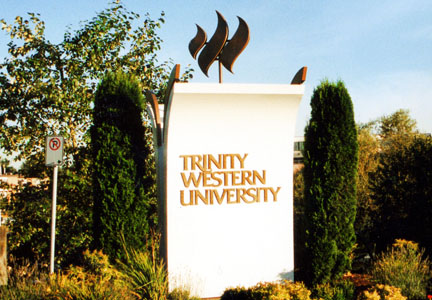
The British Columbia Supreme Court has quashed the Law Society of British Columbia’s October referendum decision to not provide accreditation to a proposed law school at Trinity Western University in Langley, B.C. The court reinstated the results of an April 2014 vote to accept degrees from the school.
 “In summary, I find that the [LSBC] benchers improperly fettered their discretion and acted outside their authority in delegating to the LSBC’s members the question of whether TWU’s proposed faculty of law should be approved for the purposes of the admissions program,” wrote Chief Justice Christopher Hinkson of the Supreme Court of B.C. in Trinity Western University v. The Law Society of British Columbia, released Dec. 10.
“In summary, I find that the [LSBC] benchers improperly fettered their discretion and acted outside their authority in delegating to the LSBC’s members the question of whether TWU’s proposed faculty of law should be approved for the purposes of the admissions program,” wrote Chief Justice Christopher Hinkson of the Supreme Court of B.C. in Trinity Western University v. The Law Society of British Columbia, released Dec. 10.
“Even if I am wrong, and the benchers had the authority to delegate the decision to the members, I find that the decision was made without proper consideration and balancing of the Charter rights at issue, and therefore cannot stand.”
The TWU degree accreditiation controversy stems from a requirement that all students and staff sign a covenant pledging to abstain from sexual intimacy outside of marriage between one man and one woman. Critics claim it infringes the rights, in particular, of lesbian and gay students.
TWU sought a declaration that the society’s decision is ultra vires and invalid and that it unjustifiably infringes on their Charter rights.
“Although I have concluded that the LSBC inappropriately fettered its discretion, because the October referendum did not attempt to resolve the collision of the competing Charter interests, I am not prepared to make such a declaration,” Hinkson ruled.
In response, the LSBC released a short statement, with society president Ken Walker saying: “This decision is important to the public and the legal profession. We will be reviewing the reasons for judgment carefully and consulting with our legal counsel regarding next steps.”
Meanwhile, intervener West Coast LEAF released a statement stating its disappointment with the ruling.
“We are very disappointed that the decision did not engage with the human rights issues at stake in the case, instead deciding the case on procedural grounds,” said Kendra Milne, director of Law Reform at West Coast LEAF. “B.C. lawyers voted twice and made it very clear that they want an inclusive profession that respects equality.”
Trinity Western said it is “celebrating” the court’s “recognition of true Canadian diversity.”
In the matter, Trinity Western argued that in making the decision not to accredit, the benchers acted outside of their jurisdiction and erred within their jurisdiction. The university argued the decision should be set aside on the grounds the law society has no jurisdiction over universities, the benchers have no authority to sub-delegate their decision to its members, the benchers fettered their discretion and allowed the members of the law society to dictate the outcome of the exercise of discretion afforded to the benchers. and also it failed to in its duty to provide procedural fairness.
Pointing to the July 2015 Ontario Divisional Court ruling in a similar case between TWU and the Law Society of Upper Canada that found the LSUC did have jurisdiction to make a decision respecting the accreditation of a TWU degree and it appropriately balanced the Charter issues at play when making its decision not to accredit, Hinkson took a slightly different view.
He ruled that, like the LSUC, the LSBC has a broad statutory authority “that includes the object and duty to preserve and protect the rights and freedoms of all persons.”
“I also find that a decision to refuse to approve a proposed faculty of law on the basis of an admissions policy is directly related to the statutory mandate of the LSBC and its duties and obligations under the [Legal Professions Act],” the judge wrote.
“I conclude that the LSBC correctly found that it has the jurisdiction to use its discretion to disapprove the academic qualifications of a common law faculty of law in a Canadian university, so long as it follows the appropriate procedures and employs the correct analytical framework in doing so.”
He said he was unable to accept the LSBC’s submissions that the benchers were informed by the views of the members, but ultimately exercised their individual judgment in reaching their decision to not accredit.
“TWU law graduates will only enrich the diversity that we celebrate as Canadians,” said Guy Saffold, a senior adviser to the president of TWU told the media.
“People from many different faith communities have long been part of Canada’s professions and cultural identity. Our graduates are practicing law, teaching in the public school system, operating successful corporations and working as nurses — while treating clients, students and members of the public with the utmost compassion, respect and integrity.”